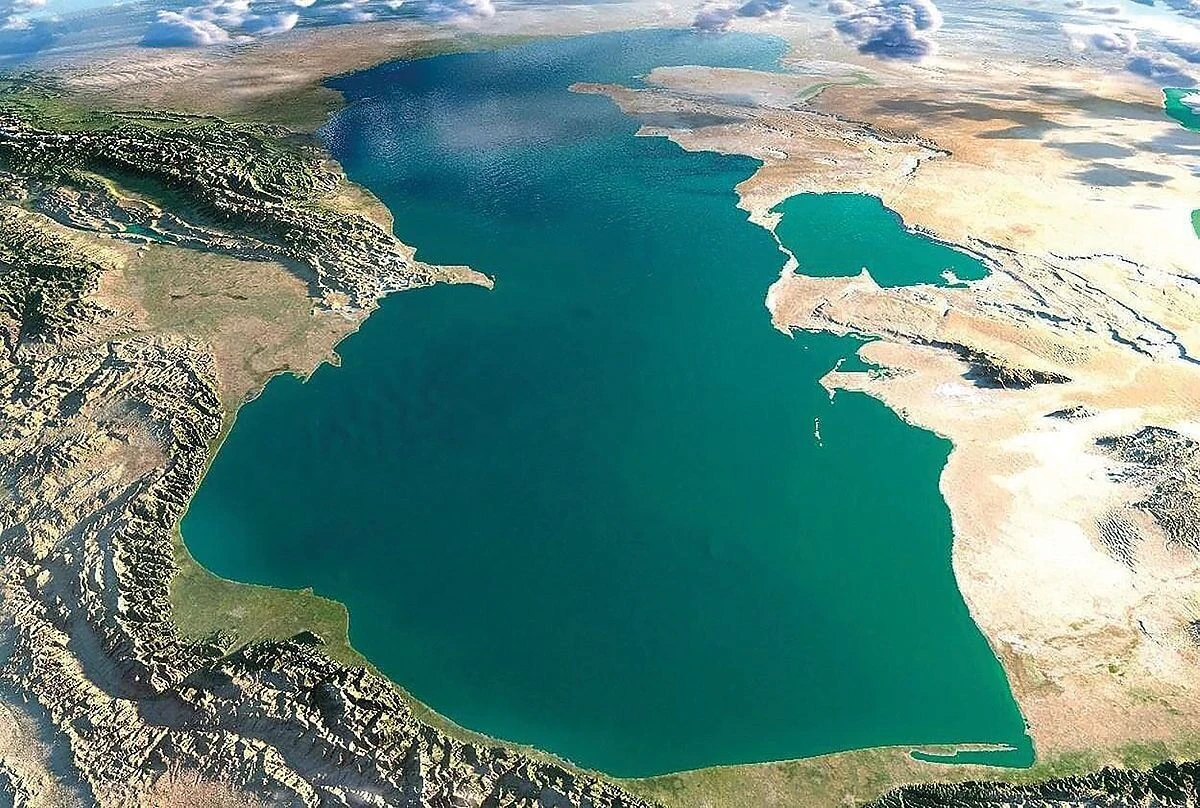The Caspian Sea is not only the world’s largest enclosed inland body of water but also one of the most ecologically and culturally rich regions on Earth.
It covers an area of about 371,000 square kilometres and borders five countries—Russia, Kazakhstan, Turkmenistan, Azerbaijan, and Iran—and has played a significant role in shaping the surrounding regions’ history, culture, and economy.
In this blog, we will focus on the Iranian Caspian coastline, which offers a wealth of attractions, from pristine beaches to historical sites and exciting activities that make it a must-visit destination.
All About the Caspian Sea
The Caspian Sea is often considered both a sea and a lake due to its enclosed nature and lack of a direct outlet to the world’s oceans. It is an incredibly diverse body of water, home to various marine life and ecosystems, making it a vital part of the global environment.
Geography
The Caspian Sea is bordered by five countries: Russia, Kazakhstan, Turkmenistan, Azerbaijan, and Iran. It stretches 1,200 kilometres from north to south and has an average width of 320 kilometres.
The Caspian’s depth varies, reaching its deepest point of 1,025 meters in the southern part, near Iran. This unique body of water is also notable for its brackish waters, which are less salty than seawater and provide an unusual environment for flora and fauna.
Ecological Significance
The Caspian Sea is home to several species found nowhere else, including the Caspian seal, the only valid seal species in the world that lives entirely in an enclosed sea. It also hosts numerous fish species, including the famous Caspian sturgeon, prized for its caviar.
Facts about the Caspian Sea highlight the region’s rich biodiversity, essential to its economy and cultural heritage. Many of its resources support the livelihoods of coastal communities.
Caspian Sea Geographical Overview
The Caspian Sea is divided into several distinct regions based on its geography and water characteristics. The southern part, where Iran lies along the coast, is significantly more profound and more saline than the northern part.
Iran’s coastline, stretching from the western borders of the Caspian Sea to the eastern shores, is characterised by scenic beaches, lush forests, and towering mountains that create a striking backdrop.
Climate
The climate along the Iranian Caspian coast is predominantly humid subtropical, making it an attractive destination for tourists seeking to escape much of Iran’s hot, desert climate. Winters tend to be mild, while summers are warm and perfect for enjoying the beaches.
The temperature can vary depending on the season and location along the coast, but the region enjoys relatively moderate weather year-round.
Hydrology
The Caspian Sea is an endorheic basin, meaning it has no natural outlet to the ocean. Its water is replenished by various rivers and streams, such as the Volga River, which drains into the northern part of the sea.
This has resulted in the Caspian’s fluctuating water levels over the centuries, creating significant changes in its shoreline.
Iranian Caspian Sea Cultural and Historical Significance
The Iranian Caspian region is a geographic marvel and a hub of rich history and culture. From ancient civilisations to modern-day tourism, the Caspian Sea has shaped people’s lives along its shores.
Historical Importance
The Caspian Sea has been a vital trade route between the East and the West. During the Silk Road period, merchants passed through the region, carrying valuable goods and fostering cultural exchange. The ancient Persian Empire, including its capital in Ctesiphon, relied on the Caspian Sea for trade and transportation, making it a central part of its economy.
Cultural Influence
The Caspian coast of Iran is home to several distinct ethnic groups, such as the Gilaki and Mazandarani peoples, each with its language, traditions, and customs. This region’s cultural diversity is reflected in its music, dance, cuisine, and architecture. The local communities maintain a deep connection to the Caspian Sea, which plays a significant role in their daily lives, from fishing to agriculture.
Landmarks and Heritage
The Iranian Caspian region also contains several historical sites, such as the Rudkhan Castle in Gilan Province, a well-preserved medieval fortress built by the Sassanid Empire. The region’s bazaars, traditional houses, and ancient temples further showcase its rich historical and cultural heritage.
Caspian Sea Beaches in Iran
The Caspian Sea beaches in Iran are among the country’s most attractive and peaceful spots. The southern coast of the Caspian is known for its lush landscapes and vibrant culture, but it also boasts some of the most beautiful beaches in the region.
Ramsar Beach
Known for its unique blend of coastal and mountainous landscapes, Ramsar is one of the most famous beaches in Iran. It is a popular destination for those seeking a relaxing retreat amidst nature. Visitors can enjoy swimming, sunbathing, and exploring nearby nature reserves and parks.
Chalus Beach
Located in the heart of Mazandaran Province, Chalus Beach is known for its calm waters and stunning views of the Alborz Mountains. It’s an excellent destination for families and outdoor lovers. In addition to the beach, visitors can enjoy a variety of local attractions, such as the Chalus River and surrounding forests.
Bandar Anzali Lagoon
Although not a traditional beach, the Anzali Lagoon offers a unique experience for nature lovers and birdwatchers. The lagoon’s calm waters are perfect for boat rides, and the surrounding wetlands are home to many species of birds, making it a paradise for wildlife enthusiasts.
What to Visit in the Caspian Region of Iran?
The Iranian Caspian region is rich in both natural beauty and historical significance. Here are some top attractions that you should not miss when visiting this part of the country:
Masuleh Village
Known for its unique architecture and breathtaking views, Masuleh is a traditional mountain village built into the hillside. Its famous stepped design means that rooftops serve as walkways for the village’s residents, providing an unforgettable experience for visitors.
Rudkhan Castle
This impressive castle, located in the forests of Gilan Province, offers a glimpse into Iran’s medieval past. With its commanding view over the surrounding valley and a rich history dating back to the Sassanid era, it is one of the Caspian region’s top cultural and historical landmarks.
Hyrcanian Forests
A UNESCO World Heritage site, the Hyrcanian Forests stretch along the Caspian coast and are home to various flora and fauna. The forested mountains are perfect for hiking and eco-tourism, allowing visitors to explore one of the world’s oldest temperate rainforests.
Bandar Anzali Lagoon
A beautiful natural reserve, the Anzali Lagoon is a hotspot for birdwatching, particularly for migratory species. It’s an ideal place for boat tours, where visitors can enjoy the tranquil surroundings and explore the diverse wildlife.
Iran Caspian Sea Activities for Tourists
The Caspian Sea in Iran offers a wide array of activities for tourists of all interests, from those seeking adventure to those needing relaxation.
Fishing and Boating
The Caspian Sea is famous for its abundant fish species, including sturgeon and carp. Tourists can enjoy fishing or boating trips, particularly around Bandar Anzali, where the calm waters provide excellent conditions.
Hiking and Trekking
The Caspian region, with its lush forests and towering Alborz Mountains, offers numerous hiking trails. One popular trek is to the Rudkhan Castle, which combines history, natural beauty, and stunning views along the way.
Cuisine
The Caspian Sea region of Iran offers a rich cuisine, featuring dishes like Baghala Ghatogh, Mirza Ghasemi, Stuffed Fish, and Torshi Tareh, blending fresh seafood, herbs, and spices.
Wildlife Watching
For those interested in wildlife, the Hyrcanian Forests and the Anzali Lagoon are perfect for birdwatching. Various migratory birds, including flamingos and pelicans, stop in these areas, making it a paradise for nature photographers.
When to Visit the Caspian Sea in Iran?
The best time to visit the Caspian Sea in Iran depends on the experiences you’re seeking. Here’s a breakdown of the seasons:
- Spring (March-May): With mild temperatures and blooming flowers, spring is an excellent time for hiking and exploring the forests and villages around the Caspian Sea.
- Summer (June–August): This is the peak season for beach vacations, as the warm weather makes it ideal for swimming, sunbathing, and enjoying the seaside resorts.
- Autumn (September–November): The weather is still warm enough to enjoy outdoor activities, and the fall foliage adds a colourful touch to the landscape, especially in the forested areas.
- Winter (December–February): Winter is a great time to visit if you enjoy a peaceful and quiet atmosphere. While it can get cold, the coastal region’s winter is relatively mild, making it perfect for a more serene getaway.
One of the best ways to discover Iran’s ancient cities is through expert-led Iran Tour Packages designed for immersive travel.
What are the must-try dishes in Iran’s Caspian region?
The Caspian Sea in Iran is a haven for natural beauty, cultural history, and exceptional food. The coastal regions, particularly in Gilan and Mazandaran provinces, are known for their unique cuisine, which blends fresh seafood with local herbs and spices.
Some of the must-try dishes when visiting the Caspian region:
- Baghala Ghatogh: A hearty dish from Gilan made with broad beans, rice, dill, garlic, and turmeric, often served with eggs.
- Mirza Ghasemi: A smoky appetiser of grilled eggplant, tomatoes, garlic, and eggs, usually enjoyed with flatbread.
- Stuffed Fish: Fresh fish like sturgeon or trout, stuffed with herbs, onions, and rice, then grilled or baked to perfection.
- Torshi Tareh: A tangy vegetable stew made with spinach, parsley, and tomatoes, cooked with vinegar and garlic for a sour, flavorful dish.
- Aloo Mosama: A savoury stew made with lamb or beef, potatoes, tomatoes, and spices like cumin and turmeric.
- Anarbij: A pomegranate-based stew with chicken or beef, offering a delightful sweet and sour flavour.
- Stuffed Chicken: Chicken stuffed with rice, dried fruits, herbs, and spices, then roasted for a festive, aromatic meal.
- Nardoon Stew: A rich dish made with pomegranate seeds, walnuts, and beef or lamb, providing a savoury-sweet taste.
- Kadoo Bareh: A pumpkin stew from Mazandaran made with rice, tomatoes, and lamb.
- Vavishka: A stew with lamb and lentils cooked with herbs, garlic, and onions for a deep, savoury flavour.
Conclusion
The Caspian Sea in Iran offers a unique and enriching travel experience. With its stunning beaches, rich cultural history, natural beauty, and wide range of activities, it’s no wonder this region continues to captivate the hearts of travellers worldwide.
Whether exploring the historical sites, indulging in local cuisine, or simply relaxing by the water, the Iranian Caspian coast promises an unforgettable journey.
FAQs About the Caspian Sea
Why is the Caspian Sea important?
The Caspian Sea is vital for its oil and gas resources, unique ecosystems, and its historical role as a trade route.
What are the best Caspian attractions in Iran?
Attractions like Masuleh Village, Rudkhan Castle, and the Hyrcanian Forests are among the top picks.
Is the Caspian Sea a Lake or a Sea?
The Caspian Sea is called a sea due to its size, but it’s technically a lake.
What to eat in Iran’s Caspian region?
The Caspian region offers dishes like Baghala Ghatogh, Mirza Ghasemi, stuffed fish, and Anarbij.



















2 Responses
Nje mrekudhi natyrore e vecant super e bjutifull
No aporta nada concreto. Sólo frases vagas y generales. Pero….dónde es más recomendable ir?? Qué ver?? Qué comidas son más recomendables? Qué monumentos visitar? No dicen nada!! No me sirvió de nada . Lo siento.